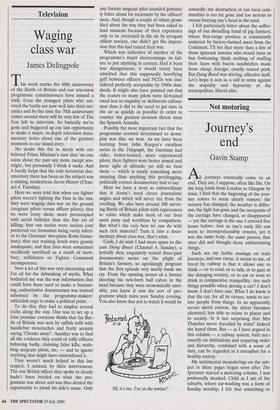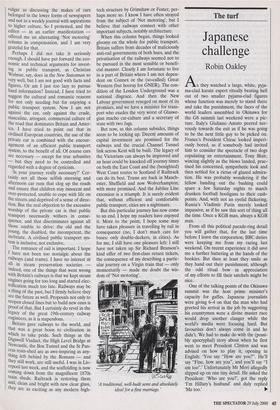Not motoring
Journey's end
Gavin Stamp
Al journeys eventually come to an end. They are, I suppose, often like life. On the long hauls from London to Glasgow by train, I find that the beginning of the jour- ney comes to seem utterly remote: the scenery has changed, the weather is differ- ent, the light has gone and the occupants of the carriage have changed, or disappeared — yet the carriage is the one I entered five hours before. Just as one's early life can seem so incomprehensibly remote, yet it was the same body, the same person, that once did and thought those embarrassing things.
Such are my feeble musings on train journeys, and one virtue, it seems to me, of travel by railway is that it allows one to think — or to read, or to talk, or to gaze at the changing scenery, or to eat or even to drink in comparative tranquillity. Are such things possible when driving a car? I don't know: I don't have one. What I do know is that the car, for all its virtues, tends to iso- late people from things. In an apparently secure metal cocoon, the driver becomes alienated, less able to relate to places and to society. Is it not surprising that Mrs Thatcher never travelled by train? Indeed she hated them. But — as I have argued in this column — a railway system, built nec- essarily on institutions and requiring order and hierarchy, combined with a sense of duty, can be regarded as a metaphor for a healthy society.
My sentimental meanderings on the sub- ject in these pages began soon after The Spectator started a motoring column. I was profoundly shocked. Child as I am of the suburbs, where car-washing was a form of Sunday worship, I felt that something so vulgar as discussing the makes of cars belonged in the lower forms of newspapers and not in a weekly journal with aspirations to higher culture. So I protested, and the editor — in an earlier manifestation offered me an alternating 'Not motoring' column in compensation, and I am very grateful for that.
Perhaps I did not take it seriously enough. I should have put forward the eco- nomic and technical arguments for invest- ing in public transport, as Christian Wolmar, say, does in the New Statesman so very well, but I am not good with facts and figures. Or am I just too lazy to pursue hard information? Instead, I have tried to suggest the cultural and romantic reasons for not only needing but for enjoying a public transport system. Now I am not against the car, only against the crude, masculine, arrogant, commercial culture of the road that dominates Britain and Amer- ica. I have tried to point out that in civilised European countries, the use of the private car is combined with the encour- agement of an efficient public transport system, to the benefit of all. Of course cars are necessary — except for true urbanites — but they need to be controlled and regarded with a degree of cynicism. `Is your journey really necessary?' Cer- tainly not all those selfish morning and afternoon car runs that clog up the roads and ensure that children stay innocent and aver-protected, unable to cope with life on the streets and deprived of a sense of direc- tion. But the real objection to the excessive worship of the private car is that public transport necessarily withers in conse- quence, and that discriminates against all those unable to drive: the old and the young, the disabled, the incompetent, the inebriate. A civilised public transport sys- tem is inclusive, not exclusive.
The romance of rail is important. I hope I have not been too nostalgic about the railways (and trams). I have no interest at all in steam preservation societies Indeed, one of the things that went wrong with Britain's railways is that we kept steam engines going for too long and started elec- trification much too late. Railways may be a thing of the past, but I firmly believe they are the future as well. Proposals not only to reopen closed lines but to build new ones is proof of that. But I certainly do revel in the legacy of the great 19th-century railway engineers, as it is stupendous. Britain gave railways to the world, and that was a great boon to civilisation in which to take pride. Such things as the Digswell Viaduct, the High Level Bridge at Newcastle, the Box Tunnel and the St Pan- cras train-shed are as awe-inspiring as any- thing left behind by the Romans — and they still work, are still useful. I was in Liv- erpool last week, and the scaffolding is now coming down from the magnificent 1870s train sheds. Railtrack is restoring them and, clean and bright with new clear glass, they are as exciting as any modern high- tech structure by Grimshaw or Foster, per- haps more so. I know I have often strayed from the subject of 'Not motoring', but I believe that railways connect with other important subjects, notably architecture.
When this column began, things looked gloomy on the whole for public transport. Britain suffers from decades of maliciously anti-rail governments of both hues, and the privatisation of the railways seemed not to be pursued in the most sensible or benefi- cial manner. Clearly I am fortunate to live in a part of Britain where I am not depen- dent on Connex or the (so-called) Great Western (but hooray for GNER). The con- dition of the London Underground was a national disgrace. And then the New Labour government reneged on most of its promises, and we have a minister for trans- port who exudes the very worst of Glaswe- gian macho car-culture and a secretary of state with two Jags.
But now, as this column subsides, things seem to be looking up. Decent amounts of capital investment are promised for the railways and the crucial Channel Tunnel link across Kent will be built. The legacy of the Victorians can always be improved and an hour could be knocked off journey times on both the East Coast and the (benighted) West Coast routes to Scotland if Railtrack can do its best. Trams are back in Manch- ester, Sheffield and now Wolverhampton, with more promised. And the Jubilee Line extension is a triumph. It is surely evident that, without efficient and comfortable public transport, cities are a nightmare.
But this particular journey has now come to an end. I hope my readers have enjoyed it. More to the point, I hope some may have taken pleasure in travelling by rail in consequence (no, I don't much care for buses: only double-deckers, in cities). As for me, I still have one pleasure left: I still have not taken up Sir Richard Branson's kind offer of two first-class return tickets, the consequence of my describing a partic- ular journey on a Virgin train that — only momentarily — made me doubt the wis- dom of 'Not motoring'.
A traditional, well-built semi and absolutely ideal for a first marriage.'



























































 Previous page
Previous page